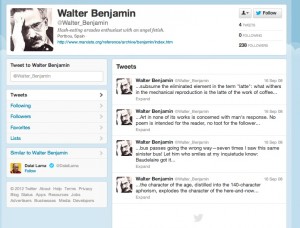This is the second part of a textual reconstruction of a talk I gave on Benjamin at SUNY Albany.
After setting things up in the first part of my presentation on Benjamin and Twitter, and demonstrating how the cyberflâneur was alive and well on “the street” of Twitter, I went looking for Walter Benjamin there as well.
As it turns out, several people have set up accounts such as this, which intermittently posts Benjamin quotes, but someone also went to the trouble of setting up this short-lived parody account:

Aside from the comedic value of this account’s first tweet—”…the character of the age, distilled into the 140-character aphorism, explodes the character of the here-and-now…—I was struck by Twitter’s characterization, as you will note in the lower left-hand corner, of the Dalai Lama as “similar” to Benjamin.
Read the rest of this entry »
Below is the text of a proposal I submitted to a conference entitled “Critical Speculations: Future Worlds, Perilous Histories, and Walter Benjamin Unbound” which will be held at SUNY Albany September 28-29, 2012
At the very end of his much-cited—and frequently misunderstood—essay on the work of art in the age of mechanical reproduction, Walter Benajmin wrote, “Humanity, which once upon a time in Homer served as an object of fascination for the gods, has now become one for itself.”
As with much of that essay, this sentence is more true now than when it was written. While one need look no further than the ubiquity of reality television to appreciate this, it is actually in social media, and especially on Twitter, that this process achieves its mass apotheosis. Indeed, Twitter is the contemporary, virtual manifestation of the Parisian Arcades that Benjamin spent the last years of his life studying.
For Benjamin, the Arcades served as an allegorical crystallization of the far-reaching and irreversible changes wrought by the accelerated rise of modernity. The same must be said of Twitter with regard to the post-modern, post-industrial, hyper-mediated present. Indeed, like a living, electronic reef, Twitter is composed of the accreted micro-sentiments of mankind. As such, it provides a protean, hyperdimensional portrait of contemporary subjectivity in all its most trivial, absurd and sublime glory.
Read the rest of this entry »
 It’s not a revolution if nobody loses. – Clay Shirky
It’s not a revolution if nobody loses. – Clay Shirky
I just finished reading Clay Shirky’s masterpiece, Here Comes Everybody, and feel compelled to recommend that you read it. It’s thoughtful, insightful, and well-written. It also a “business” book that is so rich in detail and far-reaching in implication that you can’t easily reduce it’s thesis to a PowerPointable sound-bite.
Although ostensibly about technology – “social media,” broadly speaking – the book’s focus falls less on the geeky details of wikis, blogs, and tweeting, than on the way these technologies facilitate the organization and actions of groups in an historically unprecedented, even revolutionary, manner. In the words of His Shirky-ness, “[W]e are living in the middle of a remarkable increase in our ability to share, to cooperate with one another, and to take collective action, all outside the framework of traditional institutions and organizations.”
If you feel like you or your business could benefit from greater participation in the social media revolution, or if you feel that these new, powerful, group-forming-and-coordinating tools pose an existential threat to your business or occupation (as the rise of the printing press did to medieval scribes), then you can’t afford not to read this highly readable book.
Image – “Everybody was here” – Courtesy of {dpade1337}.

